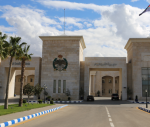The foreign reserves at the Central Bank of Jordan currently stand at more than JD8.78 billion (or $12.4 billion), which is the highest level of reserves ever reached.
While such a high level of reserves elicits relief and confidence in the dinar, one should recall that the last two years were not exactly hunky-dory, that there was some turbulence and significant fright.
Interestingly, the turbulence was caused by official statements that predicted calamities and vicious downturns if people did not accept some painful economic prescriptions.
One cannot dismiss the power of the prime minister and his ministers to affect the economy; they could make decisions that reverse trends and paths, change peeks to troughs and stir waves where there was calm.
Such power, however, seems to be only in exerting a negative. Positives such as enhancing competitiveness, improving FDI inflows, improving the human and physical infrastructure of the country seem beyond their reach or scope. Such positive changes are left to the regional developments and the will and muscle of donors.
Measuring the impact of the negative power of the economic managers is difficult (given Jordan’s regional and global exposure) except in one area: the level of foreign reserves.
One can discern this in the month(s) or so that immediately follow a speech or appearance by a prime minister or a minister to talk about or threaten an economic catastrophe.
Look, for instance, what happened to the foreign reserves at the Central Bank when the current prime minister appeared, on October 19, 2012, on the 60 Minutes TV show and stated that he would either raise energy prices or lower the exchange rate of the dinar.
As people panicked, the reserves fell in the following month by JD502 million ($709 million), to reach their lowest level since June 2008.
The reserves had already been experiencing a downwards slide, especially after a statement by the minister of finance on February 18, 2012, in which he stated that the economic situation was dangerous and could lead to a situation similar to that of Greece unless reforms take place.
He retracted his statement five days later, but the slide had already started. The fall in reserves during March-September 2012 was JD2.04 billion (close to $3 billion).
Interestingly, October witnessed a slight recovery in the position of foreign reserves, before the prime minister’s brutal ultimatum emerged and a massive drop in reserves followed.
By the way, lowering the exchange rate of the dinar had nothing to do with increasing energy prices. The government would have been the first to suffer as its foreign debt would have increased and its oil purchases would have hit the roof in terms of their dinar value. Lowering the exchange rate would have been the ultimate no no.
And although the prime minister never retracted his statement, the dinar and the economy went on to survive, not because of the positive impact of our economic managers, but because of the regional factors that tended, again, to serve Jordan: refugees brought their savings and converted them into dinars to consume and invest and donors showered Jordan with foreign funds that went to the Central Bank.













